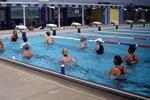
Learn more about how the theories of psychology can be used to improve athletic performance
-
Learn to develop strategies to deal with competition and training.
-
Develop communication and interpersonal skills.
-
Learn to motivate people to exercise and maintain the exercise in individuals who are mainly sedentary.
-
Maximise practice and fitness regimes.
-
Counsel individuals who have been injured.
Course Structure and Lesson Content

The Sports Psychology course has 8 lessons, as follows:
Lesson 1. Introduction
- Performance Psychology
- Exercise Psychology
- Environmental Influences
- Aspects of Sports Psychology
- Applying Sports Psychology.
Lesson 2. Psychological Traits of Successful Athletes
- Personality Inventory Determining a personality type
- Cognitive Techniques
Lesson 3. Anxiety and Arousal
- Understanding and Dealing with Anxiety
- Physiology of Anxiety
- Arousal
- Maximising Psychological State
- Focusing (or Centring).
Lesson 4. Motivation
- Motivation as an internal impulse that causes increasingly energetic action in a particular direction.
- Basic Principles of Motivation
- Intrinsic and Extrinsic Motivation
- Factors Affecting Motivation
- Motivation for fun
- Slimming for fun.
Lesson 5. Aggression
- Mental Rehearsal
- Error Parking
- Using Self Consciousness
- Using Word Association
- Anger and Conflict
- Measuring Aggression
- Simulated Practice, e-Event Procedure,
- Reliving Success, Positive,
- Conflict Handling Techniques.
Lesson 6. Leadership and Coaching
- Role of a Coach
- How to Get Attention
- Questioning
- Punishment.
Lesson 7. Team Dynamics
- Group cohesion
- Forming, Storming, Norming, Performing
- Traits of an Effective Team
- Suitable membership
- Appropriate Leadership
- Commitment to the Team
- Concern for Achieving
- Effective Work Methods, Well Organised Team Procedures
- Ability To Take Criticism
- Creative Strength
- Positive Relationships, Positive Environment.
Lesson 8. Special Groups
- Understanding Stress
- Post Game/Season Evaluation
- Gender Differences, Elite Female Athletes
- Special Considerations with Female Athletes
- Disabled Persons. Children, Readiness
- Dropping out.
Each lesson culminates in an assignment which is submitted to the school, marked by the school's tutors and returned to you with any relevant suggestions, comments, and if necessary, extra reading.
Course Duration: 100 hours
Course Aims
-
Describe the nature and scope of Sports Psychology.
-
Identify psychological traits found in successful athletes.
-
Explain effects of state of mind on athletic performance.
-
Recommend ways of maintaining or increasing motivation in an athlete.
-
Differentiate between positive and negative application of aggressive emotions in sport.
-
Discuss the role of leadership in sports coaching.
-
Explain the impact on performance of psychological interactions within a sporting team.
-
Describe variations in the sports psychology of different demographic groups.
STUDENT FEEDBACK
""I truly enjoyed this course and found it to be a valuable learning experience. The most useful and valuable aspects of this course were the practical psychological techniques that can be directly applied to improve athletic performance. I especially appreciated learning about motivation, confidence building, arousal and anxiety management, and mental skills such as imagery, self-talk, and goal setting. These concepts were not only explained theoretically, but also presented with real-life examples, making it easier to understand how sport psychology influences athletes’ behaviour, focus, and resilience during training and competition. The course has given me knowledge and tools that I can confidently use in coaching, mentoring, or supporting athletes in the future. Heny Setyawati, Indonesia

What is Sports Psychology?
In order to promote greater participation in sport, it is valuable to understand the psychology of the broader community; and in this way, determine those things that will motivate greater sporting participation.
Performance Psychology
Performance psychology is concerned with getting a better performance by applying psychological principles. It is a branch of psychology that studies the factors that allow societies, individuals and communities to flourish and develop. Performance psychology also includes the study of psychological skills and knowledge that is necessary to develop and facilitate peak performance in sports, fitness, performance arts and business.
- It may involve selecting players who have psychological characteristics that are more likely to bring success.
- It may involve attempting to change a player’s psychology/outlook, in order to increase the chances of a better performance.
There has been a growth in the field of performance psychology. The growth has applied to business and sports. By studying the psychology of athletes in a sporting situation, it has been possible to determine psychological characteristics that are most commonly present in successful sporting situations (e.g. teams where all the members are on friendly terms with each other statistically will win more often, than teams where there is conflict between members).
Physiological Psychology
Physiological psychology is a branch of biological psychology. It considers the neural mechanisms of behaviour and perception by manipulating the brains of animal subjects in experiments. The main focus is the development of theories on the link between brain and behaviour. For example, they may consider the role of the hippocampus in memory.
This differs slightly to psychophysiology, which is useful in the role of the sports psychologist.
Psychophysiology

Is the study of the physiological (somatic) responses associated with cognition (i.e. thinking, emotion etc). So psychophysiology considers the physiological bases of psychological processes. Example: Heightened anxiety or stress can change the heart rate, cause blood vessels to contract (hence blood flow slows), etc. …and that can inhibit responses/performance.
Exercise Psychology
Is the study of cognitive, psychophysiological and situational factors that influence exercise behaviour. Example: How physical exercise affects a person’s psychological behaviour …they exercise, blood flows, adrenalin may increase, waste products/toxins are removed more from the body … the mind becomes more alert.
This can involve studying the effects of such things as:
- Reasons for participating in exercise
- Reasons for not participating in exercise
- Addiction to exercise (positive & negative aspects)
- Factors affecting a person’s perception of the exercise they undertake
- Applying cognitive techniques to exercise (psych yourself up; exercising to music)
Choking
Choking is the inability to perform to a former standard. High anxiety is usually the course of choking and can lead to a decrease in the athlete’s performance. The potential for choking depends on the situation and the athlete. As anxiety increases beyond the optimal level for a task, there will be a decline in performance. A certain level of stress may be good in sport, but if this goes too far, it may result in performance decline. Self doubts and a desire to impress others can create high levels of stress, as can the other stressors we mentioned in the previous lesson. When choking occurs, the athlete’s focus is no longer on the physical aspect of his/her performance.
For example, choking might occur when –
-
The athlete is concerned about what others think about his/her performance eg. Audience, coach, team mates.
-
There is a gap between their actual performance and the goal they want to achieve in the competition.
-
A top athlete is so focussed on winning that his/her anxiety increases and they are slow to react when the start pistol goes off, so losing time.
-
In football/soccer, loud support/shouting/booing from the audience may increase the self-attention of the athlete, which can result in performance errors.
-
In tennis/football or similar, the athlete misses an easy shot/goal. They may then become afraid of repeating the same mistake, so their performance may suffer.
Learn More - Improve your knowledge, improve your career prospects
- Study for professional development.
- Improve your job and career prospects in the sporting arena.
- Study for personal interest, learning more about what motivates athletes young and old.
You can enrol today.
If you have any questions, contact us today by -
Phone (International) +61 7 5562, or (in Australia) 07 5562 1088, or
Email us at admin@acs.edu.au, or
Use our FREE COURSE COUNSELLING SERVICE.